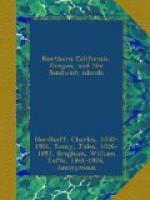Sea-island cotton would yield excellent crops if it were not that a caterpillar devours the young plants, so that its culture has almost ceased. Only 10,000 pounds were exported in 1872. The orange thrives in so few localities on the Islands that it is not an article of commerce: only two boxes were exported last year, though San Francisco brings this fruit from Otaheite by a voyage of thirty days. A burr worse than any found in California discourages the sheep-raiser in some of the Islands. The cacao-tree has been tried, but a blight kills it. In the garden of Dr. Hillebrandt, near Honolulu, I saw specimens of the cinnamon and allspice trees; but again I was told that the blight attacked them, and did not allow them to prosper. Wheat and other cereals grow and mature, but they are subject to the attacks of weevil, so that they can not be stored or shipped; and if you feed your horse oats or barley in Honolulu, these have been imported from California. Silk-worms have been tried but failed. Rice does well, and its culture is increasing.
Moreover, there is but an inconsiderable local market. A farmer on Maui told me he had sent twenty bags of potatoes to Honolulu, and so overstocked the market that he got back only the price of his bags. Eggs and all other perishable products, for the same reason, vary much in price, and are at times high-priced and hardly attainable. It will not do for the farmer to raise much for sale. The population is not only divided among different and distant islands, but it consists for much the largest part of people who live sufficiently well on taro, sweet-potatoes, fish, pork, and beef—all articles which they raise for themselves, and which they get by labor and against disadvantages which few white farmers would encounter.
For instance, the Puna coast of Hawaii is a district where for thirty miles there is so little fresh water to be found that travelers must bring their own supplies in bottles; and Dr. Coan told me that in former days the people, knowing that he could not drink the brackish stuff which satisfied them, used to collect fresh water for his use when he made the missionary tour, from the drippings of dew in caves. Wells are here out of the question, for there is no soil except a little decomposed lava, and the lava lets through all the water which comes from rains. There are few or no streams to be led down from the mountains. There are no fields, according to our meaning of the word.
Formerly the people in this district were numbered by thousands: even yet there is a considerable population, not unprosperous by any means. Churches and schools are as frequent as in the best part of New England. Yet when I asked a native to show me his sweet-potato patch, he took me to the most curious and barren-looking collection of lava you can imagine, surrounded, too, by a very formidable wall made of lava, and explained to me that by digging holes in the lava where it was a little decayed, carrying




